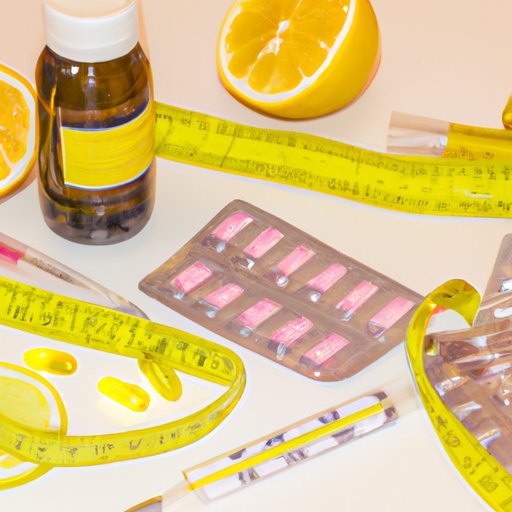
Introduction
Suffering from swelling is not only uncomfortable but also an indication that something is wrong with your body. Swelling, also known as edema, is the accumulation of fluid in the tissues and cavities of the body, leading to pain or discomfort. Fortunately, there are several ways to alleviate swelling, from natural remedies to medical treatments.
Natural Remedies for Swelling Reduction
Natural remedies can help reduce swelling in the body without causing any adverse side effects. Here are a few popular remedies to try:
Herbs like ginger and turmeric
Ginger and turmeric contain anti-inflammatory properties that can help reduce swelling and pain. You can brew ginger or turmeric tea or add the herbs into your meal for added effect.
Essential oils like lavender and peppermint
Essential oils like lavender and peppermint have anti-inflammatory and pain-relieving properties that can relieve swelling caused by inflammation. Apply them topically or inhale them by adding to a diffuser or a bowl of hot water.
Dietary changes like reducing salt intake
Reducing your salt intake can help reduce swelling, especially in the legs and feet. Salt increases the amount of sodium in your body, leading to water retention. Aim to consume less than 2,300 milligrams of sodium per day.
Simple Exercises to Reduce Swelling
Exercising can help reduce swelling by increasing lymphatic drainage, reducing water retention and improving circulation. Here are a couple of exercises that can alleviate swelling:
Yoga poses like Legs Up the Wall
In this pose, you lie on your back with your legs up against a wall, which sends the blood flow to your heart and reduces swelling in the legs. Hold this pose for several minutes, breathing deeply.
Alternating hot and cold water for soaking
Soaking your swollen limbs in alternating hot and cold water can help reduce swelling by improving circulation. Use hot water for three minutes, and then switch to cold water for thirty seconds. Repeat six times, and end with cold water.
Food and Drink Choices that Reduce Swelling
Anti-inflammatory foods and drinks can help reduce swelling in the body. Here are a few examples:
Anti-inflammatory herbs and teas like chamomile and green tea
Chamomile and green tea contain anti-inflammatory compounds that can reduce swelling. You can add chamomile into your bedtime routine and sip green tea in the morning for an added boost of anti-inflammatory properties.
Fresh fruits and vegetables like berries and kale
Berries and kale are rich in antioxidants, anti-inflammatory compounds, and nutrients that help reduce swelling. Consume them as a snack or add them to your meals for a healthy boost.
Medications for Swelling Reduction
If natural remedies and exercises do not alleviate your swelling, you may need to try medications. Here are some common types of medication for reducing swelling:
NSAIDs like aspirin and ibuprofen
The nonsteroidal anti-inflammatory drugs (NSAIDs) like aspirin and ibuprofen can help reduce swelling caused by inflammation. These drugs come in different strengths and may have some side effects like stomach upset and dizziness.
Antihistamines like Benadryl
Antihistamines like Benadryl can reduce swelling caused by allergic reactions. These drugs reduce the body’s histamine response, which causes swelling, redness, and itching. Side effects may include drowsiness and dry mouth.
Other anti-inflammatory drugs like corticosteroids
Corticosteroids are potent anti-inflammatory drugs that are used to reduce swelling in people with severe inflammation. These drugs may have serious side effects if used for a long time, such as weight gain and weakened immune system.
Lifestyle Changes for Swelling Reduction
Changing your lifestyle habits can help reduce swelling in your body naturally. Here are some tips:
Reducing sodium in the diet
Reducing your salt intake is an effective way to reduce swelling. Instead of using salt, try flavouring your meals with herbs and spices. Avoid processed foods and restaurant meals that tend to be high in sodium.
Getting enough sleep
Your body needs enough rest to heal and regenerate. Aim to get at least 7-8 hours of sleep every night to prevent fatigue and swelling.
Proper hydration
Dehydration can cause swelling in the legs and feet, so it is essential to drink enough water throughout the day. Aim for at least eight glasses of water each day. Drinking herbal tea or coconut water can add extra hydration without added sodium.
Medical Treatments for Swelling Reduction
Seeking medical treatment is necessary in severe cases of swelling. Here are some medical treatments your doctor may recommend:
Diuretics
Diuretics help your body to eliminate excess water buildup, especially in the legs and feet. However, these drugs may have some side effects like dehydration, potassium loss, and muscle cramps.
Corticosteroids
Corticosteroids are powerful anti-inflammatory drugs that reduce swelling in the body. However, they may have adverse side effects if used for a long time, such as high blood pressure, weakened immune system and osteoporosis. They are only prescribed in severe cases of swelling.
Conclusion
Reducing swelling in the body is necessary to prevent discomfort and other health problems. With natural remedies, exercises, medical treatments, and lifestyle changes, you can alleviate the swelling and improve your overall health. However, it’s essential to consult a medical professional before trying medications or medical treatments. Take a holistic approach and try different remedies to find what works best for you.




